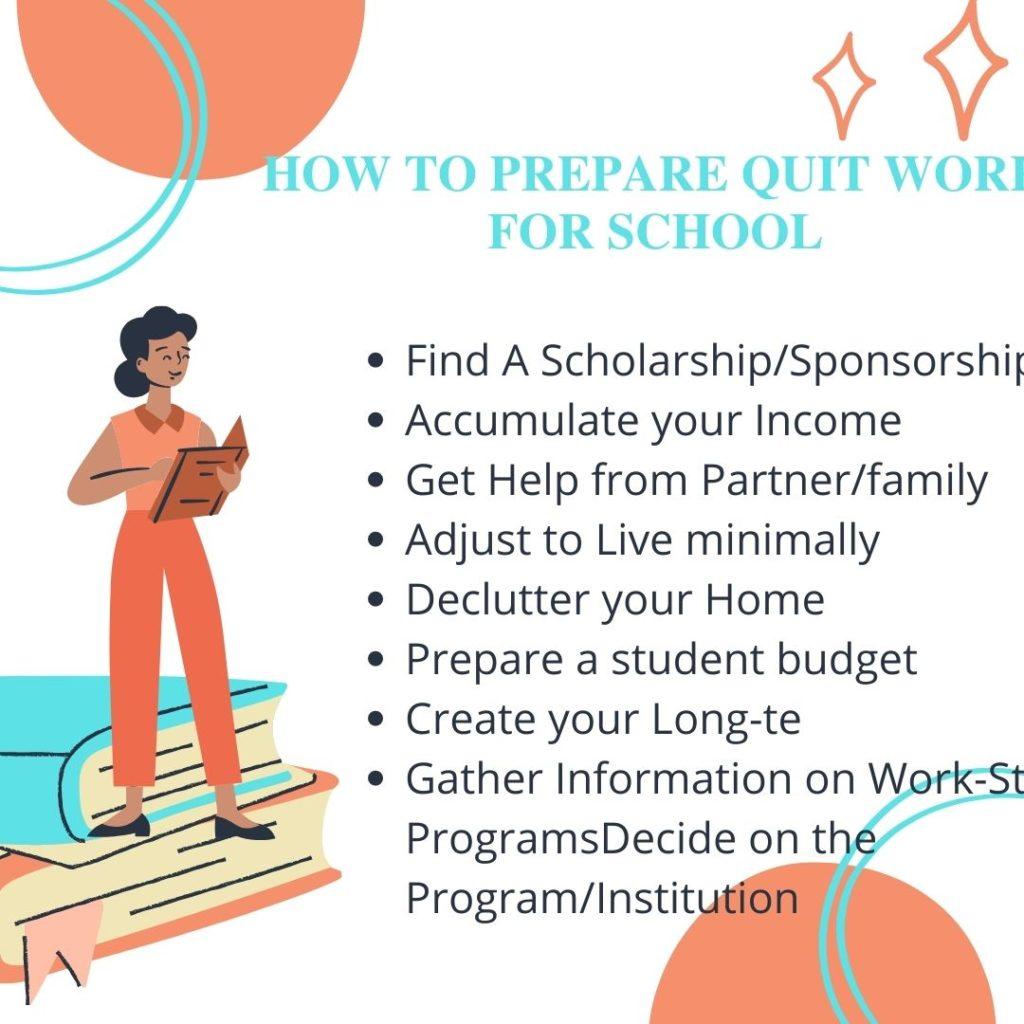It is okay and worthwhile for one to quit work and go back to school. Education qualifications gives you leverage in your career. Through education you acquire knowledge and skills that make you a better employee and overall person.
While going back to school for working moms is quite commendable, not many can manage to work, parent, and study at the same time. As a result many are hard-pressed and take the option of quitting their jobs to go back to school.
Deciding to quit work and concentrate on studying full time ensures you can fully focus on studies, it advances your work skills, and ensures a work-life balance.
Quitting work to go back to school means you will be without your salary. You therefore need a plan in place for catering both for your school’s needs and personal needs. Without a good financial plan you may regret your move.

Reasons Quitting Work for School is Recommended
1. It Ensures Full Focus on Studies
Studying can be quite intensive. The lectures, the practicals, and the exams all require time and energy investment from the student. Doing this along with work can make you lose focus and not dedicate enough time and energy to the studies. You may hence end up failing in the studies. As such it is better to quit work and dedicate full time to the studies.
2. School Advances your Work Skills
Studying exposes you to more advanced skills and knowledge. It puts you in a better competitive position in the job market in future. Therefore concentrating fully on studies now opens you up for better employment opportunities in the future.
There is a high chance of landing a better job after completing your studies than your current job. The move is very important for career growth and development especially if there are limited growth opportunities at your current job.
3. It Enhances Work-Life Balance
Like mentioned earlier, it is extremely hard for a working mom to succeed in her studies while working. There is just so much that needs to be done in limited time and this can lead to burnout and a very poor work-life balance.
To ensure that your life is not extremely affected, it is best to quit work and do studies full time. By doing so, you will have adequate time for studies, family, and self to live a well balanced life.
Read: What to Gift Retiring/Leaving Colleagus/Boss

Guide to Successfully Prepare to Quit Work for Studies
1. Choose a Relevant Program and Institution Beforehand
You will need to decide on what program you are going back to school for. It may be guided by your long-term goal, as it can either be staying in the same field or moving to another field.
If you intend to remain in the same career, then you need to choose an advanced program in the same program. If you are intending to switch careers, then go for a relevant program. Just make sure that the program you choose will be something you stick with in future.
Once you have decided on the program that you will pursue once you quit your job, you need to find the school at which you will study the program. It needs to be an institution reputably offering the program of your choice.
In addition, you may be guided by factors such as reputation, fees, grants/aid, and location among others.
2. Find A Scholarship Before Quitting Job
Paying for studies out of your pocket is financially straining. You may not be able to survive it if you do not have a huge amount of money saved before you quit your job.
A good option would be finding scholarships or sponsorship that can help pay off the educational burden. There are many offers out there and you can be lucky to even get a full scholarship. Nonetheless even a partial scholarship will take a huge financial burden off your shoulder.
Also, you can get an individual or firm willing to sponsor your studies. It will ease the financial burden of quitting work and finish your studies.
3. Save While you are Still Working
Even with a scholarship, you will still need money for accommodation, upkeep among others things. Back at home, you may still be expected to chip in your share of obligations. At the very least you need a significant amount saved up before you actually quit the job and go back to school.
Have a target amount that should cover your financial needs for the time you will be out of the workforce. Work to momentarily reach this figure by saving generously off your pay. Also, clear any debts you have when you still have your income.
Another of raising a good amount of money is de-cluttering your home. Go through your home and identify those items that are still valuable but you no longer need them and can do without them. Sell and add the money to the saved-up amount.
Read: How to Effectively Declutter your Home
4. Adjust to Live Minimally
To survive studying full time with no income, you will need to be mindful of how you spend your money. You must hence practice this and adjust before you actually quit your job for school.
It includes minimizing your expenses and living minimally. Start downsizing and living on the minimum both to save up and also ensure an easy adjustment later when you actually work and you are studying.
Even if you can currently afford a little recreation or luxury spending, don’t. Adjust now because these habits will continue when you finally quit and are studying.
6. Prepare a Student Budget
Draw up an estimate of basically the expenses you will need in school. The budget helps with planning realistically and also in your target saving. By knowing how much you need to survive, you shall make more informed actions on getting the amount. Stick to the basics but make the budget as realistic as possible.
Read: Why you Should Keep your Job
7. Ask for Help from Partner and Family
You can also manage to going back to studying after quitting your job if you have a supportive partner that will shoulder your loss of income. Talk it out about your move and ensure you are both on the same page on how to handle the financial side of it.
Your family can also come in and help you shoulder some of these expenses. Family members make a very strong support system and all you need to do is ask. Chat them up about your plans about going back to school and see what they can do to help you transition smoothly . It may be in monetary form or in-kind such as offering childcare, accommodation, fees among others.
8. Have a Long-term Goal
Before you quit your job to go back to school, you need a long-term plan. You need to map out why you are going back to school and how the acquired studies will help you in the long run.
Your long-term plan may be finding a better high position well-paying job or it could be to acquire skills to start your own business. Having this mapped out beforehand will help you focus on studies when the time to quit your job comes.
9. Participate in Work-Study Programs
After enrolling back to school, you may be interested in programs where you can work at school. Usually, these programs will give you a stipend for the semester in addition to reduced tuition with the added benefit of helping you build relationships with faculty and show on your resume that you were involved with the school.
It is very important if you still need the financial boost especially since your income will not be available anymore. You will still have adequate time and energy for your studies and still cover some expenses on the side.
Related Articles
Reasons to Take a Career Step Back
How to Come from a Career Break
How to Balance Work, Parenting and Studies



